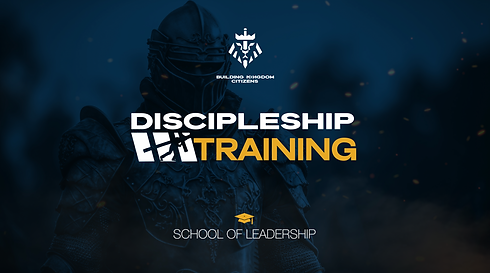discipleship

why discipleship?
The focal point of Building Kingdom Citizens Discipleship is radical transformation from the inside out through practical application of the Word of God. An unfortunate and very common practice in the modern Church is plenty of hearing, studying, and learning with no action.
the statistics
2 in 5 Christians are not engaged in discipleship. 1
Only 1 percent of church leaders say “today’s churches are doing very well at discipling new and young believers. 2
Only 20 percent of Christian adults are involved in some sort of discipleship activity. 2
Barna studies indicate that millions of Christians believe that discipleship is a solo affair, with only personal and private implications. 2
1. Barna, 2022, Two in Five Christians are Not Engaged Discipleship, 23/02/2024, {https://www.barna.com/research/christians-discipleship-community/}
2. Barna, 2015, New Research On the State of Discipleship, 23/02/2024, {https://www.barna.com/research/new-research-on-the-state-of-discipleship/}
the mandate
It’s easy to memorize a verse, study the historical context, and take a test. However, if we examine Scripture, Jesus didn’t disciple the original 12 this way. His practical method worked with anyone who was willing; no matter their IQ, schooling, upbringing, gender, age, or social background. Anyone can become a disciple because all it takes is a willing heart, true surrender, repentance, and accountability.
The disciples were ready and did follow Jesus at all costs. It was a matter of immediate application to the written (logos) Word and spoken (rhema) Word of Christ. Knowing what to do is just the starting point of real discipleship, then you actually have to do what it says. We are commanded to “Go and make disciples” as Jesus stated in Matthew 28:18-20. It was a mandate, not a suggestion.
the practical strategy
Most of the BKC Discipleship Curriculum is built around a series of lessons followed up by an extensive curriculum packet filled with Scripture, teaching, and questions. Each person in the small group, including BKC Leadership, must complete the questions independently and then share with the group. These multilayer questions prompt discovery, admittance, confession, and true repentance about what you practically plan to do to change. Each small group member also gets regular one-on-one sessions with their BKC Leaders to evaluate their progress and stay accountable.


How You're Graded
Unlike other discipleship programs, BKC’s grading system works based on real change in your speech and behavior. You’re “measured” based on the transformation that is evident and obvious to the BKC leadership. All your other small group members will see and celebrate your change too.
You cannot successfully go through this discipleship program “faking the funk” or “going through the motions” because of how the classes and curriculum are structured. You will naturally produce public Godly fruit as a result of your commitment and willingness to this Biblical process.
what to expect
meeting schedule
Every small group first goes through a 7 Day Kingdom Revival bootcamp. You are required to attend a lesson for 7 days in a row, at the agreed upon dates and times by the small group. After this bootcamp, each small group meets once per week, at the agreed upon date and time by the small group members. No matter if it’s a teaching lesson or group discussion, the meeting length is approximately 1 hour and 30 minutes each session. In addition, each member of the group will have randomly scheduled one-on-one meetings, in person or remotely, with their BKC Leaders for accountability and their transformation progress. These meetings are also important for any areas that private and confidential information may need to be shared and discussed that would not be appropriate for the small group setting.
Class topics
Below are the class topics that are part of the BKC Discipleship Program. The first three classes are introductory. The remaining classes are for those who officially commit to the process. Please click below to learn more about each class and curriculum.

















